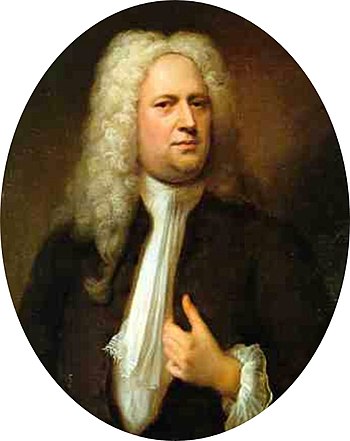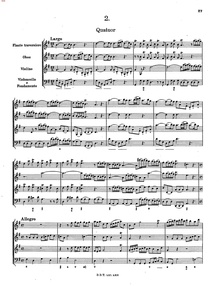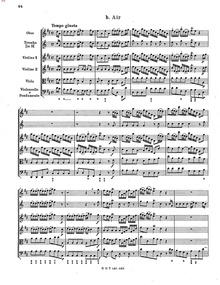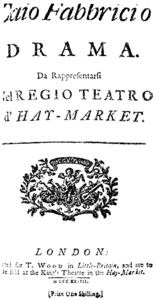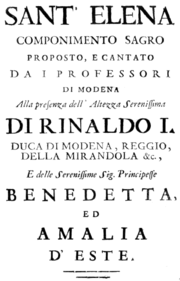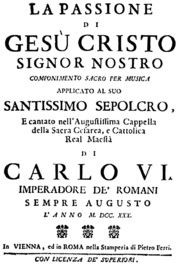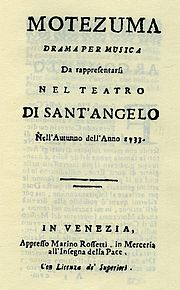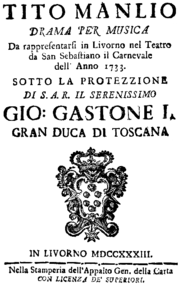Music year 1733
◄◄ | ◄ | 1729 | 1730 | 1731 | 1732 | Music year 1733 | 1734 | 1735 | 1736 | 1737 | ► | ►►
Overview of the music years
Further events
| Music year 1733 | |
|---|---|
| Georg Friedrich Handel, portrayed by Balthasar Denner in 1733 |
Events
Johann Sebastian Bach
- Johann Sebastian Bach has been the Thomaskantor and musical director of the Thomaskirche in Leipzig since May 30, 1723 . In 1729 he also took over the management of the Collegium musicum founded by Georg Philipp Telemann in 1701 . Through the additional management of the college, he considerably expands his scope in Leipzig's musical life. With this student ensemble he performs German and Italian instrumental and vocal music, including his own concerts that he wrote in Weimar and Köthen, which he will later transform into harpsichord concerts with up to four soloists. The concerts take place once or twice a week in the Zimmermannisches Caffee-Hauß (destroyed in the war in 1943) or in the associated garden.
- February 15 to July 2 : Due to regional mourning after the death of Elector Friedrich August I , no music may be performed in the entire Electorate of Saxony . During this time Johann Sebastian Bach composed the two-movement Missa in B minor , with which he applied to Friedrich August II for the title of composer at Hof Capelle .
- August 3rd : On the occasion of the name day of August III. Bach performs his cantata Frohes Volk, geschnügte Sachsen (BWV Anh. 12) for the first time.
- September 5th : On the occasion of the birthday of Prince Elector Friedrich Christian , Johann Sebastian Bach conducts the world premiere of his cantata Let us take care, let us watch in Leipzig.
- December 8th : Johann Sebastian Bach's cantata Tönet, you timpani! Sound out trumpets! will be premiered as a congratulatory cantata on the occasion of the birthday of Maria Josepha , Electress of Saxony and Queen of Poland, with the subtitle Dramma per musica in Leipzig.
- Johann Sebastian Bach becomes a father for the seventeenth time. The tenth child together with his second wife Anna Magdalena Bach , Johann August Abraham is born and dies in the same year. Her daughter Regina Johanna, born in 1728, also dies. Between 1726 and 1733, seven small children died in the family, and one son (Gottfried Heinrich) was mentally disabled. In 1728, at the age of 51, Bach's last surviving sister Maria Salome also died. Some Bach biographers suspect that this stroke of fate caused Bach to get into a creative crisis in the following years.
georg Friedrich Handel
- Georg Friedrich Handel , who founded the “second opera academy” together with Johann Jacob Heidegger in 1729 , is the musical director of this successor organization to the Royal Academy of Music .
- Handel has lived in London at 25 Brook Street since July / August 1723 and lived here on two floors until his death in 1759. Almost all works created since 1723 are composed in this house. Preparations for the performances often take place in the Handel dining room .
- January 27 : George Frideric Handel's opera Orlando has its world premiere at the King's Theater in the Haymarket in London. The libretto , whose author is unknown, is based on the epic Orlando furioso by Ludovico Ariosto . Senesino , Anna Maria Strada , Francesca Bertolli and Antonio Montagnana sing the leading roles . The work is a success, but it is canceled after ten performances and not played until the 20th century.
- February 21 : The oratorio Deborah by Georg Friedrich Händel with a libretto by Samuel Humphreys has its world premiere at the King's Theater on the Haymarket in London. The work is popular with the public, but financially only moderately successful.
- July 10 : The world premiere of the oratorio Athalia by Georg Friedrich Händel takes place at the Sheldonian Theater in Oxford. The libretto is by Samuel Humphreys. It is inspired by the tragedy of Athalie , the Jean Racine has composed 1,691th
- October 30 : Georg Friedrich Handel's adaptation of Leonardo Vinci's opera Semiramide riconosciuta based on the libretto by Pietro Metastasio is premiered at King's Theater in London's Haymarket. The pasticcio , which Handel had to perform with an almost completely new line-up, was a flop.
- December 4 : Caio Fabbricio , Handel's second pasticcio based on Johann Adolf Hasse 's opera of the same name , is not a success either. Giovanni Carestini and Anna Maria Strada will sing the leading roles in the premiere at the King's Theater.
- December: A rival opera company opens the Opera of the Nobility (the so-called aristocratic opera ) at Lincoln's Inn Fields Theater , with Nicola Antonio Porpora as the composer. Previously, this society had lured almost all of Handel's ensemble, including Senesino. Since there is no market in London for two competing opera houses, the competition is ruinous. The situation is exacerbated by the fact that Handel's lease expires at the end of the season and Johann Jacob Heidegger lets the King's Theater to the Adelsoper. In addition, the aristocratic opera managed to hire the famous Italian castrato Farinelli .
- The first published print of Georg Friedrich Händel's Wassermusik appears in 1733/1734 under the title “THE CELERBRATED WATER MUSICK IN SEVEN PARTS”, edited by J. Walsh.
- In 1733, Georg Friedrich Händel published his second collection with nine suites for harpsichord under the title Suites de Pièces pour le Clavecin . The first collection of these publications appeared in 1720.
Domenico Scarlatti
- Domenico Scarlatti is the Portuguese princess Maria Bárbara de Bragança , whom he met at the court of the pious and extravagant King John V in Lisbon and taught as a music teacher, after her marriage to the Spanish heir to the throne Don Fernando of Asturias (from 1746 King Ferdinand VI. ) followed to Spain. Since October 1730 (and until May 16, 1733) the Alcázares Reales in Seville has been his permanent residence and place of work. Then the farm moves north to the area around Madrid , where, depending on the season, it alternates between the castles of Buen Retiro , El Pardo , Aranjuez , La Granja and El Escorial .
Georg Philipp Telemann
- Georg Philipp Telemann has been Cantor Johannei and Director Musices of the city of Hamburg since 1721 , one of the most respected musical offices in Germany. In this position Telemann undertook to compose two cantatas per week and one passion per year, but in later years he would fall back on earlier works for his cantatas. He also composes numerous pieces of music for private and public occasions, such as memorial days and weddings.
- In addition, Telemann has taken over the management of the Hamburg Opera on Gänsemarkt for an annual salary of 300 thalers , is rebuilding the Collegium musicum, which was founded by Matthias Weckmann in 1660 but has since ceased to perform, and is also taking on a position as Kapellmeister for the court Margraves of Bayreuth . From time to time he delivers instrumental music and an opera there every year.
- Georg Philipp Telemann publishes his Tafelmusik , a collection of instrumental works. The original title is Musique de table . The work is one of Telemann's best-known compositions and is considered the climax and at the same time one of the last examples of court music .
- For Au gust the Strong writes Telemann, the funeral music immortal fame Friederich August (falsely called Serenata Eroica), the mayor of Hamburg Garlieb Sillem the funeral music swan song.
- Telemann publishes his music collection singing, playing and figured bass exercises , which was very well known in his time.
- He is also planning a music-theoretical treatise on the recitative in 1733. However, this has not been handed down, so it must be assumed that it was either lost or was discarded by Telemann.
Antonio Vivaldi
- Antonio Vivaldi has been musical director of the Teatro Sant'Angelo in his hometown of Venice since 1726 . There, both as a composer and as a violin virtuoso, he became a living legend and a “pilgrimage destination” for many musicians from all over Europe.

Carl Heinrich Graun with his wife Anna Luise, painting by Antoine Pesne (around 1733)
Other biographical events
- Wilhelm Friedemann Bach becomes organist at the Sophienkirche in Dresden. Here Johann Gottlieb Goldberg is one of his students, and he maintains the acquaintance of Dresden court musicians such as Johann Adolph Hasse , Johann Georg Pisendel and Silvius Leopold Weiss .
- Giovanni Battista Bononcini , forced by a plagiarism affair , goes from London to Paris and composes here for the “ Concert spirituel ”.
- Pietro Gnocchi , who has been Kapellmeister at the Brescia Cathedral since 1723, also becomes the cathedral's organist.
- Carl Heinrich Graun composes the opera Lo Specchio della Fedelta for the wedding celebrations of the Prussian Crown Prince Friedrich and the Beverness Princess Elisabeth Christine, which premiered in 1733 in Salzdahlum . The Crown Prince was so enthusiastic about the opera that he expressed the wish that Duke Ludwig Rudolf would allow him to sign the composer to his court in Rheinsberg . In fact, in 1735, together with his brother - the concertmaster and composer Johann Gottlieb Graun - he will join the chapel of the Prussian Crown Prince and later King Frederick the Great as Vice Kapellmeister.
- Johann Adolph Hasse , to whom King August the Strong, who died in February 1933, bestowed the title of “Royal Polish and Electoral Saxon Kapellmeister ”, officially entered Dresden on December 1, 1733 under the new ruler August III. on. Until then, Hasse and Faustina Bordoni will travel through Italy and increase their fame with joint opera appearances.
- From 1733 onwards, Georg Friedrich Kauffmann published Harmonische Seelenlust on a subscription basis , the first printed collection of choral preludes for organ since Samuel Scheidt's Tabulatura Nova (1624). This collection will contain all of Kauffmann's chorale arrangements, but Kauffmann died of consumption before the entire edition was published and his widow continued the publication until 1736. Overall, see the harmonics Seelenlust 66 basso - chorales and 98 chorale preludes.
- Jean-Marie Leclair is "Ordinaire de la musique du roi" at the court of Louis XV. , to whom he thanked his Op. 2 dedicated. He will hold this position until 1737. He also gave numerous public concerts at the Concerts spirituels until 1737 .
- Carl Theodorus Pachelbel , who emigrated to North America in 1730 and initially lived in Boston , was appointed to the Trinity Church in Newport as the first organist , having previously been involved in the installation of the new organ from England. He worked here until 1735.
- Giovanni Battista Pergolesi composed the opera Il prigionier superbo for the Empress' birthday on August 28, 1733 with the interlude La serva padrona , which, detached from the main opera, was soon re-enacted everywhere and became the first repertory piece in musical theater.
- Nicola Antonio Porpora accepted an invitation to London to take over the artistic direction of the newly founded Opera of the Nobility , which was sponsored by the Prince of Wales and competed with the Georg Friedrich Handel opera company supported by King George II . With his first work for this company, Porpora made a clever move. After it became known that Handel's opera Arianna in Creta , planned for the 1733/1734 season, is based on the arrangement of a libretto by Pietro Pariati ( Arianna e Teseo ), which Porpora had previously set to music, Paolo Antonio Rolli immediately wrote a sequel. The new opera Arianna in Nasso opens the season at Lincoln's Inn Fields Theater on December 29, 1733, four weeks before Handel can present his Ariadne on January 26, 1734 at the Haymarket Theater.
- After several failures, Jean-Philippe Rameau succeeds in staging his first scenic work, the operatic drama Hippolyte et Aricie based on Jean Racine's tragedy Phèdre . This work is in the tradition of Jean-Baptiste Lully , but it far exceeds the musical richness that has been accustomed to date. A contemporary thinks "this opera contains enough music to make ten out of it".
- Jan Dismas Zelenka , who after the death of the Dresden conductor Johann David Heinichen in 1729, whom he had already represented during his illness, applied to Elector Friedrich August II to succeed him, is subject to Johann Adolf Hasse . In 1733 he was only appointed court composer and in 1735 a “church composer”. With the exception of occasional trips to Prague, he stayed in Dresden until his death in 1745.
Foundations
- June 15 : With the approval of the British Crown Prince Friedrich Ludwig von Hanover , several noble gentlemen meet in open opposition to Handel to found a new opera company, the so-called Opera of the Nobility , whose artistic direction is Nicola Antonio Porpora . Friedrich thus carries the political dispute with his father George II , a supporter of Handel, into the London music scene. A large number of Handel's singers, including Senesino , Antonio Montagnana , Francesca Bertolli and Celeste Gismondi, join the new opera troupe, only Anna Maria Strada remains loyal to Handel.
- December 29th : The Opera of the Nobility opens its season at the Lincoln's Inn Fields Theater with the opera Arianna in Nasso by Nicola Antonio Porpora on the libretto by Paolo Antonio Rolli .
World premieres
Stage works
Opera
- January 27th : The premiere of the opera Sancio Panza governatore dell'isola Barattaria by Antonio Caldara takes place at the Teatrino di corte in Vienna.
- January 27th : George Frideric Handel's opera Orlando premieres at King's Theater on Haymarket in London. The libretto, whose author is unknown, is based on the epic Orlando furioso by Ludovico Ariosto . Senesino , Anna Maria Strada , Francesca Bertolli and Antonio Montagnana sing the leading roles . The work is a success, but it is canceled after ten performances and not played until the 20th century.
- January 30th : The Dramma per musica in three acts Adriano in Siria by Geminiano Giacomelli based on the libretto by Pietro Metastasio is premiered at the Teatro San Giovanni Crisostomo in Venice.
- Carnival: The dramma comico in three acts La pazienza di Socrate by Francisco António de Almeida based on the libretto by Nicolò Minato is premiered in the Ribeira Palace in Lisbon.
- Carnival: The Dramma per musica in three acts L'Issipile by Nicola Antonio Porpora based on a libretto by Pietro Metastasio will be performed for the first time in the Palazzo Rucellai in Rome.
- March 12th : Giuseppe riconosciuto , the libretto for an azione sacra in two parts by Pietro Metastasio is premiered in the Hofburgkapelle in Vienna in the setting by Giuseppe Porsile . According to Charles Burney , Johann Adolph Hasse describes the music in this work as the best he has ever heard.
- April 8th : The pasticcio La caccia in Etolia or Die Jagd in Jetolien by Geminiano Giacomelli is performed for the first time in the Theater am Kärntnertor in Vienna.
- April: The dramma per musica in three acts Il Tigrane by Geminiano Giacomelli based on the libretto by Pietro Antonio Bernardoni is premiered at the Teatro Ducale in Piacenza.
- May 2nd : The opera Siroe, Re di Persia by Johann Adolf Hasse based on the libretto by Pietro Metastasio is premiered at the Teatro Malvezzi in Bologna.
- August 28 : The premiere of the opera buffa La serva padrona ( The Maid as Mistress) by Giovanni Battista Pergolesi takes place at the Teatro San Bartolomeo in Naples. The libretto is by Gennaro Antonio Federico. The work was originally inserted as a comic interlude between the acts of the opera seria Il prigioner superbo by the same composer.
- August 30 : Antonio Caldara's opera L'Olimpiade based on the libretto by Pietro Metastasio is premiered in Vienna. It is the first of more than 70 settings of the Metastasio libretto.
- October 1st : Jean-Philippe Rameau's first opera Hippolyte et Aricie has its world premiere at the Académie royale de musique in Paris. The libretto is by Abbé Simon-Joseph Pellegrin . The audience for the premiere is divided into two: the conservative Lullysten , who consider Rameau's music to be too modern because it does not correspond to the tradition of Jean-Baptiste Lully , and the so-called Ramists , who consider Rameau's setting to be fantastic.
- October 30 : Georg Friedrich Handel's adaptation of Leonardo Vinci's opera Semiramide riconosciuta based on the libretto by Pietro Metastasio is premiered at King's Theater in London's Haymarket. The pasticcio , which Handel had to perform with an almost completely new line-up, was a flop.
- November 4th : In Antonio Caldara's setting , Pietro Metastasio's libretto is demofoonte on the occasion of the name day of Emperor Charles VI. first performed in Vienna.
- November 14th : The premiere of the opera Motezuma by Antonio Vivaldi takes place at the Teatro Sant'Angelo in Venice . It remains the only documented performance. The work with the libretto by Girolamo Alvise Giustials was already considered lost during the composer's lifetime .
- December 4 : Caio Fabbricio , Handel's second pasticcio based on Johann Adolf Hasse 's opera of the same name , is not a success either. Giovanni Carestini and Anna Maria Strada will sing the leading roles in the premiere at the King's Theater.
- December 29th : The opera Arianna in Nasso by Nicola Antonio Porpora based on the libretto by Paolo Antonio Rolli is premiered at Lincoln's Inn Fields Theater.
- Thomas Arne - Rosamund (libretto by Joseph Addison )
- Francesco Feo - L'Issipile (Dramma per musica; libretto by Pietro Metastasio; world premiere at the Teatro Regio in Turin)
- John Gay - Achilles (world premiere at the Theater Royal , Covent Garden)
- Carl Heinrich Graun - Lo specchio della fedeltà (world premiere in Salzdahlum )
- Johann Friedrich Lamp - Dione
- Leonardo Leo - Amor vuol sofferenza (world premiere in Naples)
- Jean-Philippe Rameau - Samson (Music Lost)
- Antonio Vivaldi - Montezuma (world premiere in Venice)
Oratorio
- February 21 : The oratorio Deborah by Georg Friedrich Händel with a libretto by Samuel Humphreys has its world premiere at the King's Theater on the Haymarket in London. The work is popular with the public, but financially only moderately successful.
- July 10 : The world premiere of the oratorio Athalia by Georg Friedrich Händel takes place at the Sheldonian Theater in Oxford. The libretto is by Samuel Humphreys. It is inspired by the tragedy of Athalie , the Jean Racine has composed 1,691th
- Willem de Fesch - Judith
- Benedetto Marcello - Il trionfo della poesia e della musica nel celebrarsi la morte, e la esultazione, e la incoronazione di Maria semper Vergine Assunta in Cielo (no performance available)
- Georg Philipp Telemann - You let us through the blood (TWV 5:18)
Serenata
- Nicola Antonio Porpora - Leudaclo e Tosi, "egloga" (libretto by Giuseppe Maria Cati; world premiere in Venice)
Instrumental music
Concerts
- Jacques Aubert - Suites de concerts de Symphonies Op. 13
- Michel Corrette - 6 Concertos Comiques , Op. 8th
- Francesco Geminiani - Concerti grossi , Op. 3 (London)
Chamber music
- Jacques Aubert - " Les amuzettes " for hurdy-gurdy , musettes, violins and oboes Op. 14th
- Georg Philipp Telemann
- Tafelmusik (Hamburg)
- 6 Quatuors ou Trios (Hamburg)
- Quartet in A major (TWV 43: A2)
- Quartet in A minor (TWV 43: a1)
- Quartet in D major (TWV 43: D2)
- Quartet in E major (TWV 43: E1)
- Quartet in E minor (TWV 43: e3)
- Quartet in G major (TWV 43: G3)
bassoon
- Johann Ernst Galliard - 6 Sonatas for the Bassoon or Violoncello with a thorough Bass for the Harpsichord (with John Walsh , London)
flute
- Joseph Bodin de Boismortier - 6 Sonates pour la flûte traversiere avec la basse , Op. 44 (Paris)
- Willem de Fesch - 10 sonatas for 2 transverse flutes or 2 violins and B. c., Op. 7 (self-published London 1733)
- Georg Philipp Telemann - 12 fantaisies à traversière sans basse , (TWV 40: 2–13; Hamburg)
- Alexandre de Villeneuve
- Conversations en manière de sonates , solo sonatas, Op. 1 (Paris)
- Conversations en manière de sonates , trio sonatas, Op. 2 (Paris)
violin
- Willem de Fesch - 6 sonatas for violin and B. c., Op. 8th
- Georg Friedrich Handel - Trio Sonatas , Op. 2 (HWV 386–394)
- Pietro Locatelli - L'arte del violino: XII concerti, cioè violino solo, con XXIV capricci ad libitum , Op. 3 (Amsterdam)
violoncello
- Willem de Fesch - 6 Cello Sonatas, Op. 8b
Keyboard music
harpsichord
- Carl Philipp Emanuel Bach - Harpsichord Concerto in A minor (H.403)
- Johann Sebastian Bach - French Style Overture (BWV 831)
- Maurice Greene - Choice Lessons for Harpsichord (London, 1733)
- georg Friedrich Handel
-
Suites de Pièces , HWV 434-442
- Harpsichord Suite No. 1 (HWV 434)
- Harpsichord Suite No. 2 (HWV 435)
- Harpsichord Suite No. 3 (HWV 436)
- Harpsichord Suite No. 4 (HWV 437)
- Harpsichord Suite No. 5 (HWV 438)
- Harpsichord Suite No. 6 (HWV 439)
- Harpsichord Suite No. 7 (HWV 440)
- Harpsichord Suite No. 8 (HWV 441)
- Harpsichord Suite No. 9 (HWV 442)
-
Suites de Pièces , HWV 434-442
Vocal music
Spiritually
- Johann Sebastian Bach
- Mass in B minor (BWV 232 I)
- Paolo Benedetto Bellinzani - 3 Magnificat a 4 Voci
- Giovanni Battista Bononcini - Laudate pueri (for 5 vocal parts and orchestra)
- Christoph Graupner - Let your ear listen to wisdom (GWV 1138/33)
- Georg Philipp Telemann - Oh how void, oh how fleeting (TWV 4: 6)
-
Jan Dismas Zelenka
- Missa Eucharistica , D major (ZWV 15)
- Missa Purificationis , D major (ZWV 16)
- Requiem (ZWV 46)
Worldly
- Johann Sebastian Bach
- Cantata Let us worry, let us watch (BWV 213)
- Cantata sound, you timpani! Sound out trumpets! (BWV 214)
- Cantata Happy People, Merry Saxony (BWV Anh. 12)
- Paolo Benedetto Bellinzani - Madrigali a due, a tre, quattro, e cinque voci , Op. 6th
- Joseph Bodin de Boismortier - Cantata Ixion
- Georg Friedrich Kauffmann - Harmonious lust for soul
- Jan Dismas Zelenka
- Barbara dira effera (ZWV 164)
- 8 Italian Arias (ZWV 176)
Popular music
- William Thomson - Orpheus caledonius: or, A collection of Scots songs
Textbooks
- Georg Philipp Telemann - Singing, playing and figured bass exercises (TWV 25: 39–85; Hamburg)
- Alexandre de Villeneuve - New method for apprendre la musique
Instrument making
-
Andreas Silbermann
- completes the organ in St. Peter and Paul in Rosheim .
-
Antonio Stradivarius
- manufactures the violins Des Rosiers , Rode and Khevenhüller ex Menuhin.
Born
- January 17 : Thomas Linley , English musician and stage composer († 1795 )
- April 2 : Giacomo Tritto , Italian composer and music teacher († 1824 )
- August: Johann Gottfried Malleck , Austrian organ builder († 1798 )
- September 5 : Christoph Martin Wieland , German poet, translator, editor and librettist († 1813 )
- September 22nd (baptized): Anton Fils , German composer († 1760 )
- October 29 : Gottfried van Swieten, diplomat and patron of several composers of classical music († 1803 )
Exact date of birth unknown
- Anna Lucia De Amicis , Italian soprano († 1816 )
- Ann Street Barry , English singer, dancer and stage actress († 1801 )
Date of birth around 1733
- Johann Christian Fischer , German composer and oboist († 1800 )
Died
- February 26 : Johann Adam Birkenstock , German violinist and composer (* 1687 )
- March 30th : Paris Francesco Alghisi , Italian composer, organist and conductor (* 1666 )
- May 18 : Georg Böhm , German composer (* 1661 )
- June 2 : Christian Petzold , German organist and composer (* 1677 )
- August 24th : Jean-Baptiste Moreau , French composer (* 1656 )
- September 11th : François Couperin , French organist and composer (* 1668 )
- October 14 : Pietro Pariati , Italian poet and librettist (* 1665 )
- October 20 : Pierre Dandrieu , French priest, organist and composer (* 1664 )
- October 26 : Antonio Veracini , Italian violinist and composer (* 1659 )
- November 23 : Michelangelo Faggioli , Italian lawyer and composer (* 1666 )
Exact date of death unknown
- Francesco Paolo Masullo , Italian singer and conductor (* 1679 )
Died before 1733
- Gaspard Corrette , French composer and organist (* around 1671 )
Died after 1733
- Johann Gottfried Vogler , German composer, cantor, organist and violinist (* 1691 )
See also
Web links
Commons : Music 1733 - Collection of Images, Videos and Audio Files
Commons : Opera Libretti 1733 - Collection of Images, Videos and Audio Files
Individual evidence
- ↑ Antonio Vivaldi - Works sorted by date of origin. In: Klassika.info. Retrieved August 28, 2019 .
- ↑ a b Georg Philipp Telemann - Works sorted by date of origin. Retrieved October 12, 2019 .
- ↑ Johann Sebastian Bach - works sorted by time of origin. In: Klassika.info. Retrieved October 12, 2019 .
- ↑ Georg Friedrich Händel - Works sorted by date of origin. Retrieved October 12, 2019 .
